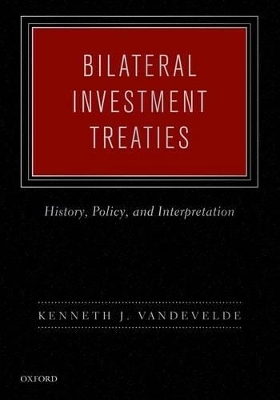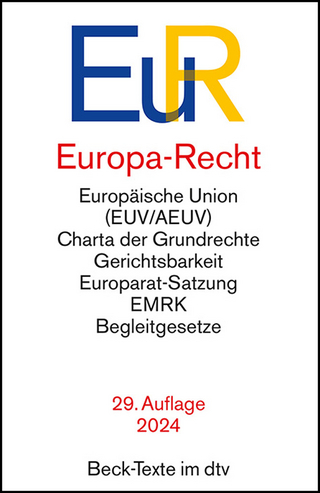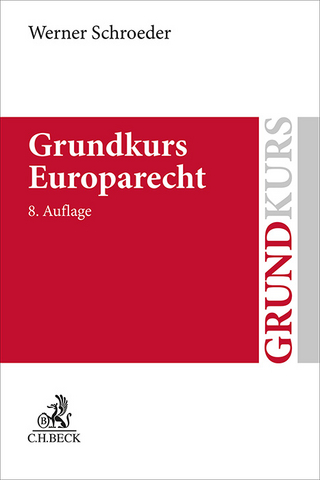
Bilateral Investment Treaties
Oxford University Press Inc (Verlag)
978-0-19-537136-9 (ISBN)
Author Kenneth Vandevelde argues that the primary purpose of the BITs is to promote the application of the rule of law to foreign investment, while a secondary purpose is to create a liberal investment regime. He further argues that BITs are based on six core principles: reasonableness, security, nondiscrimination, access, transparency and due process. The book explains each of these principles and analyzes the major BIT provisions based on them. Vandevelde addresses the host of complex questions that BITs engender: Do bilateral investment treaties attract foreign investment or otherwise contribute to economic development? Do BITs limit host state regulatory discretion too much? Why should countries continue to conclude BITs? What is meant by BIT guarantees of "fair and equitable treatment" and "full protection and security"? What is the scope of the BIT provision for most-favored-nation treatment? The book's expert analysis of these questions makes it useful to policy makers in the area of international economic relations, attorneys representing multinational companies, and anyone interested in the process of economic globalization.
Professor Vandevelde has 20 years of experience in the area of international investment law. He represented the United States in investment-related disputes before the Iran-United States Claims Tribunal and served as the lead attorney within the State Department on investment matters, participating in the preparation of the U.S. Model BIT and in the negotiation of US BITs. In 1992, he authored United States Investment Treaties (Kluwer). Since then, he has published numerous articles on BITs, has spoken about these agreements around the world, and has served as a consultant on BITs to the U.S. Senate Foreign Relations Committee, to foreign governments and to private investors. He currently is Professor of Law at Thomas Jefferson School of Law in San Diego, California, where he served as Dean from 1994 to 2005. He earned his law degree from Harvard Law School and an undergraduate degree in sociology from the University of Louisville.
1 INTRODUCTION ; 1.1 The Core Principles of the BITs ; 1.2 The Content of the BITs ; 1.3 The Plan of this Book ; 1.4 Citations to BITs, Awards and Literature ; 1.5 Apologies, Alibis and Acknowledgements ; 2 HISTORY ; 2.1 The Colonial Era: 1500-1944 ; 2.1.1 The Emergence of a Global Economy: 1820-1914 ; 2.1.2 The Global Economy Collapses: 1914-1944 ; 2.2 The Cold War Era: 1944-1989 ; 2.3 The Global Era: 1990 - Present ; 3 POLICY ; 3.1 Economic Liberalism ; 3.1.1 Microeconomic Theory ; 3.1.2 Macroeconomic Theory ; 3.2 The Critique of Economic Liberalism ; 3.3 Development Economics ; 3.4 The Empirical Evidence ; 3.4.1 Foreign Investment and Growth ; 3.4.2 Foreign Investment and Inequality ; 3.4.3 Environmental and Labor Concerns ; 3.5 The Role of BITs ; 3.5.1 Promoting a Liberal Investment Regime ; 3.5.2 Promoting the Rule of Law ; 3.6 The Effect of BITs ; 4 SCOPE ; 4.1 Introduction ; 4.2 The Definition of Investment ; 4.2.1 Structure and Policy ; 4.2.2 Origins ; 4.2.3 Arbitral Practice ; 4.3 The Definition of Investor ; 4.3.1 Structure and Policy ; 4.3.2 Origins ; 4.3.3 Arbitral Practice ; 4.4 The Temporal Application of a BIT ; 4.5 Exceptions ; 4.5.1 The Essential Security Interests Exception ; 4.5.2 The Taxation Exception ; 5 REASONABLENESS ; 5.1 Introduction ; 5.2 Fair and Equitable Treatment ; 5.2.1 Structure and Policy ; 5.2.2 Origins ; 5.2.3 Arbitral Practice ; 5.3 Unreasonable or Discriminatory Measures ; 5.3.1 Structure and Policy ; 5.3.2 Origins ; 5.3.3 Arbitral Practice ; 5.4 The International Minimum Standard ; 6 SECURITY ; 6.1 Introduction ; 6.2 Fair and Equitable Treatment ; 6.3 Full Protection and Security ; 6.3.1 Structure and Policy ; 6.3.2 Origins ; 6.3.3 Arbitral Practice ; 6.4 Observance of Obligations ; 6.4.1 Structure and Policy ; 6.4.2 Origins ; 6.4.3 Arbitral Practice ; 6.5 Expropriation ; 6.5.1 Structure and Policy ; 6.5.2 Origins ; 6.5.3 Arbitral Practice ; 6.6 War and Civil Disturbance ; 6.6.1 Structure and Policy ; 6.6.2 Origins ; 6.6.3 Arbitral Practice ; 6.7 Currency Transfers ; 6.7.1 Structure and Policy ; 6.7.2 Origins ; 6.7.3 Arbitral Practice ; 6.8 Preservation of Rights ; 7 NONDISCRIMINATION ; 7.1 Introduction ; 7.2 Most Favored Nation and National Treatment ; 7.2.1 Structure and Policy ; 7.2.2 MFN Treatment: Origins ; 7.2.3 MFN Treatment: Arbitral Practice ; 7.2.4 National Treatment: Origins ; 7.2.5 National Treatment: Arbitral Practice ; 7.3 War and Civil Disturbance ; 7.4 Unreasonable or Discriminatory Measures ; 7.5 Fair and Equitable Treatment ; 7.6 The International Minimum Standard ; 8 TRANSPARENCY ; 8.1 Introduction ; 8.2 Publication ; 8.3 Information Exchange ; 8.4 Participation in Decision Making ; 8.5 Fair and Equitable Treatment ; 9 ACCESS ; 9.1 Introduction ; 9.2 The Economics of an Open Capital Account ; 9.3 Establishment ; 9.3.1 Structure and Policy ; 9.3.2 Origins ; 9.3.3 Arbitral Practice ; 9.4 Currency Transfers ; 9.5 Performance Requirements ; 9.6 Entry and Sojourn ; 9.7 Employment ; 10 DUE PROCESS ; 10.1 Introduction ; 10.2 Investor-State Dispute Resolution ; 10.2.1 Structure and Policy ; 10.2.2 Origins ; 10.2.3 Arbitral Practice ; 10.2.3.2 Submission of the Dispute to Local Remedies ; 10.3 State-State Dispute Resolution ; 10.3.1 Structure and Policy ; 10.3.2 Origins ; 10.3.3 Arbitral Practice ; 10.4 Denial of Justice ; 10.4.1 Treaty Texts ; 10.4.2 Arbitral Practice
| Erscheint lt. Verlag | 22.4.2010 |
|---|---|
| Verlagsort | New York |
| Sprache | englisch |
| Maße | 257 x 173 mm |
| Gewicht | 1151 g |
| Themenwelt | Recht / Steuern ► EU / Internationales Recht |
| ISBN-10 | 0-19-537136-4 / 0195371364 |
| ISBN-13 | 978-0-19-537136-9 / 9780195371369 |
| Zustand | Neuware |
| Haben Sie eine Frage zum Produkt? |
aus dem Bereich


